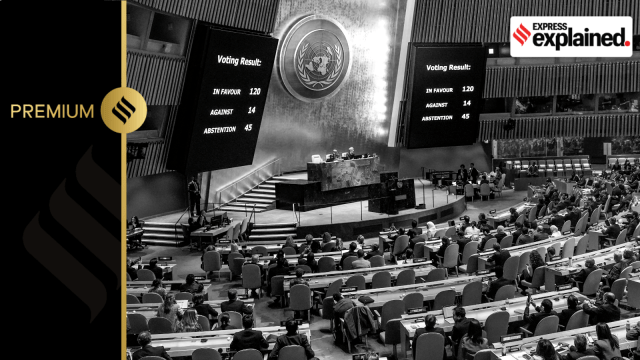India abstained in a UN General Assembly vote on a resolution that called for an immediate humanitarian truce in the Israel-Hamas conflict on Friday (October 27). The resolution, which does not contain the words ‘Hamas’ and ‘hostage’, was carried with 120 votes in favour and 14 against.
Before this vote, an amendment to the text proposed by Canada, naming Hamas, was rejected because it failed to get the support of two-thirds of members present and voting. India voted in favour of this amendment, along with 86 other nations.

India’s abstention in the vote exemplified the balancing act it has adopted on the ongoing conflict in the Gaza Strip. Here are four broad takeaways from the proceedings at the UNGA, and India’s response — broken down into specific components.
FIRST, India joined Australia, Canada, Germany, Japan, Ukraine, and the United Kingdom in the group of 45 countries that abstained on the resolution titled “Protection of civilians and upholding legal and humanitarian obligations”.
The resolution, which called for an “immediate, durable and sustained humanitarian truce leading to a cessation of hostilities” and unhindered humanitarian access to the Gaza Strip, was drafted by a group of 22 Arab countries and was proposed by Jordan, which has been vocal in its criticism of the Palestinians civilian casualties in the Israeli bombardment. Among the co-sponsors of the resolution were Bangladesh, Maldives, Pakistan, Russia, and South Africa.
Israel, the United States, five small Pacific island nations, and four Eastern European countries — Austria, Croatia, Czechia, and Hungary — were among the 14 members who voted against the resolution. Jordan said a vote against the resolution would amount to approving a “senseless war” and “senseless killing”, while Israel rejected the vote as “infamy”.
SECOND, the amendment proposed by Canada and co-sponsored by the US, sought to fix the responsibility of Hamas in the crisis. The amendment asked for the insertion of a paragraph in the resolution that would state that the General Assembly “unequivocally rejects and condemns the terrorist attacks by Hamas that took place in Israel starting on 7 October 2023 and the taking of hostages, demands the safety, well-being and humane treatment of the hostages in compliance with international law, and calls for their immediate and unconditional release”.
Story continues below this ad
India went with the majority (87) on this vote, while 55 member states voted against it, and 23 abstained. The President of the 78th session of the UNGA, Dennis Francis, announced that the draft amendment could not be adopted.
An AP report said Pakistan’s UN Ambassador Munir Akram drew loud applause when he said the Arab-drafted resolution had deliberately not condemned or mentioned either Israel or any other party. So, Akram argued, “If Canada was really equitable (with its proposed amendment), it would agree either to name everybody — both sides who are guilty of having committed crimes — or it would not name either as we chose.”
THIRD, unlike resolutions of the UN Security Council, resolutions of the UNGA are not legally binding. Therefore, despite the comprehensive defeat, Israel and the US are not obliged to act on the resolution. However, as the UAE’s representative told reporters, the resolution carries “incredible weight and moral authority”.
“120 votes in this kind of geopolitical environment is a very, very high signal of the support for international law, for proportionate use of force, and it is a rejection of the status quo that is currently happening on the ground,” the AP report quoted the UAE’s Lana Nusseibeh as saying.
Story continues below this ad
FOURTH, the balanced position taken by India was in line with the one that it has maintained in the other ongoing — and deeply polarising conflict — in the world: the Russia-Ukraine war. While the circumstances, politics, and conditions of the two wars are vastly different and not comparable, the diplomatic toolkit of hedging and balancing between the warring sides has been a consistent feature of New Delhi’s approach.
This is the approach that carried the day during the consensus-building exercise at the G20 Summit as well. However, the geopolitics of the Middle East are both more volatile and complicated, as well as closer home — and India will need to mobilise all its diplomatic skills and goodwill with the main actors to negotiate the coming weeks and months. Here are the main elements of the Indian statement at the UNGA.
* It condemned violence, especially the October 7 attacks by Hamas, conveying its support for Israel.
It started by saying that “in a world where differences and disputes should be resolved by dialogue, this august body should be deeply concerned at recourse to violence… Violence as a means to achieve political objectives damages indiscriminately, and does not pave the way for any durable solutions”.
It said that the “terror attacks in Israel on 7th October were shocking and deserve condemnation”, and called for the “immediate and unconditional release” of the hostages. It described terrorism as “a malignancy and knows no borders, nationality, or race”, and asked the world not to “buy into any justification of terror acts”.
Story continues below this ad
* It then balanced out its support with a statement on the plight of the people of Gaza.
It said: “Casualties in the ongoing conflict in Gaza are a telling, serious and continuing concern. Civilians, especially women and children are paying with their lives. This humanitarian crisis needs to be addressed. We welcome the international community’s de-escalation efforts and delivery of humanitarian assistance to the people of Gaza. India too has contributed to this effort.”
* India expressed concern at the security situation and urged “all parties” — which would include both Israel and its rival Iran, as well as groups like Hezbollah — to exercise restraint and responsibility.
“India is deeply concerned at the deteriorating security situation and astounding loss of civilian lives in the ongoing conflict. The escalation of hostilities in the region will only exacerbate the humanitarian crisis. It is necessary for all parties to display the utmost responsibility,” it said.
* New Delhi reiterated its principled position on the Israel-Palestinian issue.
It said, “India has always supported a negotiated Two-State solution to the Israel-Palestine issue leading to the establishment of a sovereign, independent and viable State of Palestine living within secure and recognized borders, side-by-side in peace with Israel.”
* It counselled diplomacy and dialogue.
“For this, we urge the parties to de-escalate, eschew violence and work towards creating conditions for an early resumption of direct peace negotiations”, it said.
Story continues below this ad
For latest updates on the situation on ground, click here.








































